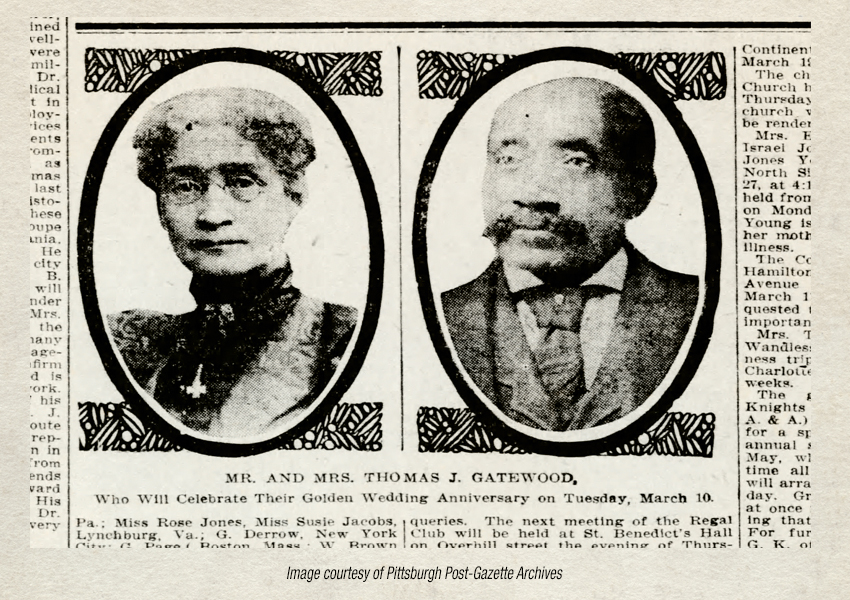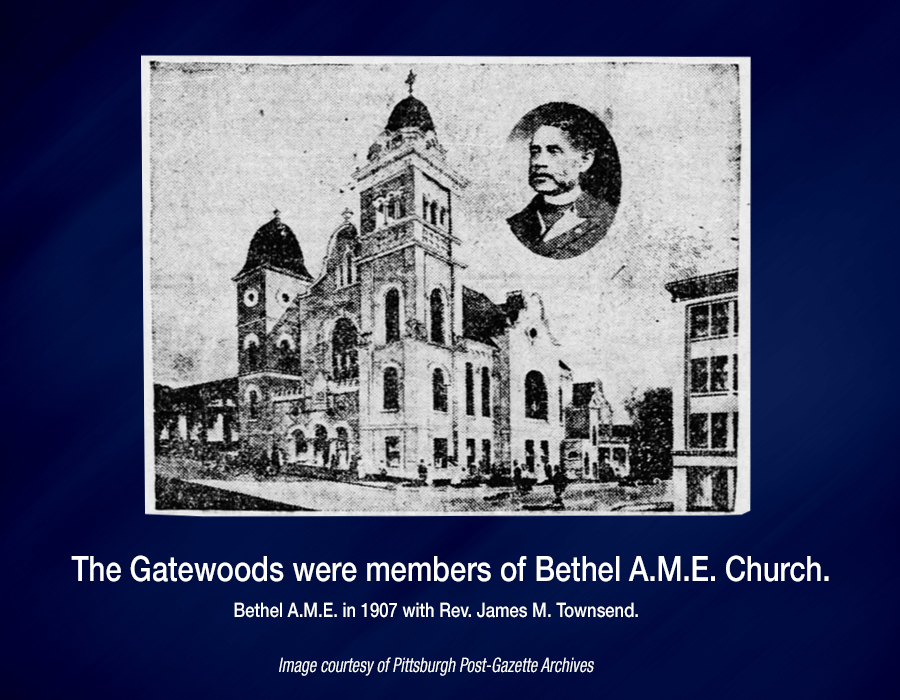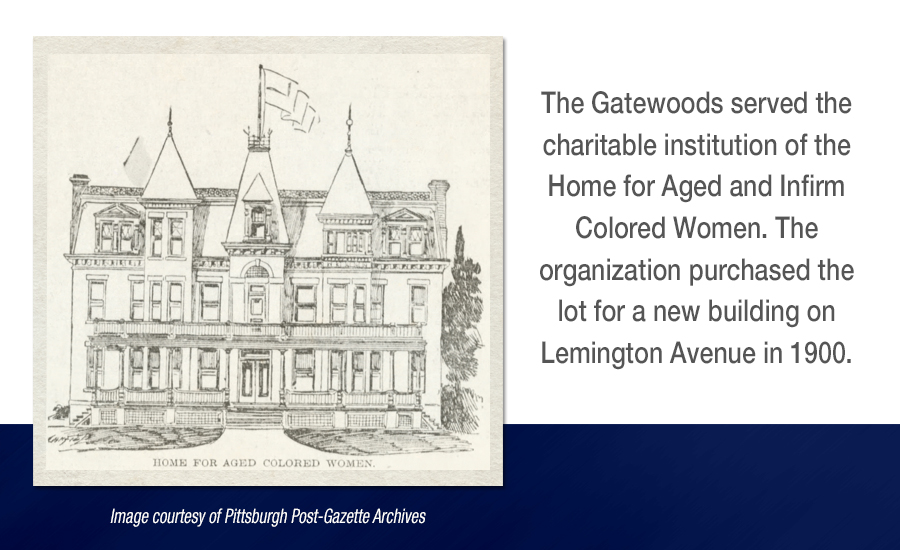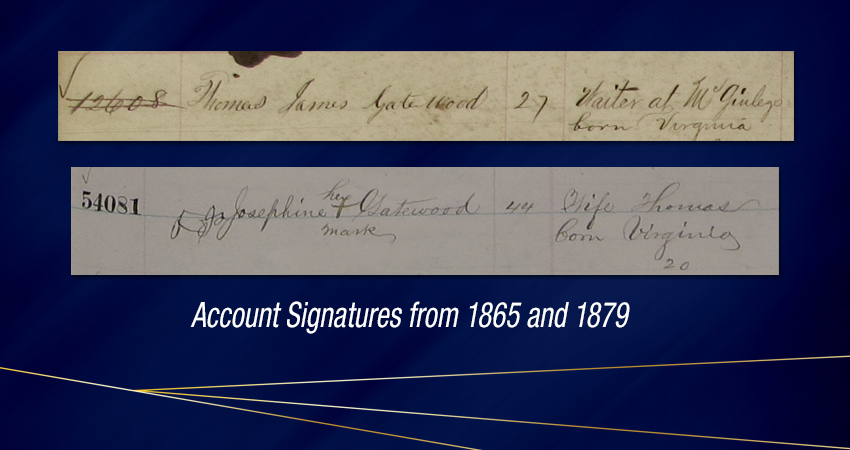Josephine and Thomas Gatewood

Josephine Gatewood, 1837-1912
Thomas Gatewood, c.1838-1910
Josephine and Thomas Gatewood were born to slave families in Virginia. They were emancipated during the Civil War and moved to Pittsburgh, where they became community leaders active in charity work and civic life.
Josephine Gatewood was born in 1837 in Harrisonburg, Rockingham County, Virginia. Contemporary sources list her maiden name as Gray, which may have been from the slave-holding family by that name in antebellum Harrisonburg. Thomas Gatewood was a year or two Josephine’s junior, and was a slave of the Pennybacker family of Rockingham County.
The Gatewoods married in 1858 after a two-year courtship. Their daughter Mary was born in 1861, and their son John William in 1863. The birth of the Gatewood children occurred during the Civil War, which came to Rockingham County in 1862 when Union forces under Gen. Nathaniel Banks clashed with Confederate forces led by Gen. Stonewall Jackson. For a time, Gen. Banks headquartered in Harrisonburg.
Some contemporary sources say that Thomas Gatewood purchased his family’s freedom around this time; other sources say that he and his family escaped bondage and made their way north. The Gatewoods arrived in Pittsburgh in September 1864. With them were Thomas’ brother, Ambrose, and the latter’s wife and children.
The brothers and their families settled at 45 Clark Street in the Hill District. They found employment as whitewashers. Ambrose moved his family to Westmoreland County within a few years while Thomas Gatewood found a job as a waiter at the Monongahela House, one of Pittsburgh’s premier hotels, which had hundreds of African Americans on staff. He later joined the staff of McGinley’s, a posh restaurant on Wood Street.
Thomas Gatewood was gifted with the ability to make friends everywhere he went. He was not long in the category of stranger or newcomer in the family’s new home town. Gatewood so impressed people that he was recommended to Edward C. Negley when the latter became the city’s postmaster in 1873. Negley hired Gatewood as a letter carrier and then promoted him to stamping clerk. Thomas Gatewood was likely the first African American to work for the United States Postal Service in Pittsburgh.
After leaving the Post Office, Gatewood organized a group of jubilee singers. Black American music was engaging more and more audiences in the late 1870s, and such singing groups were enjoying popularity. Gatewood teamed up with former Fisk Jubilee singer Benjamin W. Thomas, recently returned from touring Europe. With Gatewood serving as manager and Thomas as musical director, the local group went by the name the Centennial Jubilee Singers. They toured the states of the Upper Midwest for six years.

In the 1880s, Gatewood embarked upon yet another career, that of male nurse. He was trained by some of the most respected physicians in the city – Drs. Thomas Wilson Shaw, Thomas J. Gallaher, William R. Hamilton, Joseph Phillips and A.M. Pollock. Among Gatewood’s patients were iron manufacturers Abraham Garrison and Christopher Zug.
Gatewood’s acquaintance with men of influence led to the last job he held, that of messenger for the city controller’s office. It was a position of high trust, involving custody and transit of cash, receipts and important official documents. Gatewood had earned a reputation for absolute dependability. He maintained that reputation as a city employee and was presented a gold badge after years of faithful service.
An engaged citizen, Gatewood became a leader in both charity work and local politics. He was on the board of directors of the Home for Aged and Infirm Colored Women, and both he and his son were Red Cross volunteers who assisted Black military members during furloughs in Pittsburgh. Gatewood was president of the Thirteenth Ward Independent Republican club, a member of the Colored Workingmen’s Political Association, and the Thirteenth Ward’s representative on Allegheny County’s Republican Executive Committee. He served in the ward’s jury pool and was a candidate for the ward’s school director in 1897.
During the 1890s, Gatewood resumed his affiliation with the music world when he became manager of the Tennessee Jubilee Singers. It is possible he took over management of this group after the 1892 death of his friend and colleague, Benjamin W. Thomas.

The Gatewoods were members of Bethel A.M.E. Church, where Josephine Gatewood dedicated her life to serving others. She was president of the Women’s Mite Missionary Society, an officer of the church’s Charity Club and Household of Ruth. She was one of the first deaconesses ordained in Bethel A.M.E. Church. The deaconess board oversaw such ministries as providing clothes to poor children so they could attend Sunday school. Josephine Gatewood was also a vice president of the Home for Aged and Infirm Colored Women, as well as a vice president of the Industrial Home for Colored Girls.
The couple’s wide circle of friends included some of the luminaries of African American society in Pittsburgh at the time – Dr. Robert and Mary V. Brady, Mr. and Mrs. Thomas M. Tate, Mrs. Rachel Jones, and the Tanner and Dorsey families. Dr. George G. Turfley was their physician.
The Gatewoods were married for 52 years. In March 1908, on the occasion of their golden anniversary, their portraits were published in The Pittsburgh Press, and their remarkable life stories were recounted. They received a flood of well-wishers in their home at 2806 Vera Street in the Hill District, where they had lived for nearly 30 years.
When Thomas Gatewood died in November 1910, his obituary made the front page of local newspapers. The respect and affection he inspired in all who knew him resulted in the largest funeral anyone could remember in the history of the Hill District, drawing thousands of mourners and scores of city dignitaries. Josephine Gatewood passed away in June 1912.
Thomas Gatewood opened savings accounts at Dollar Bank in 1865 and 1901. Josephine Gatewood became a depositor in 1879.
